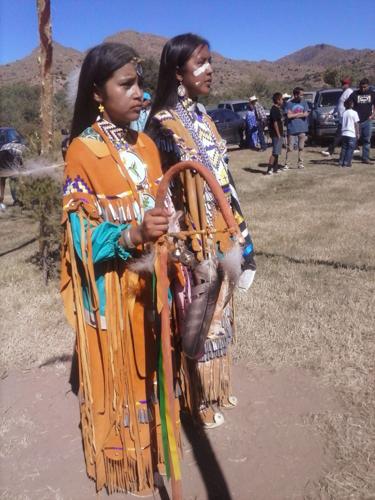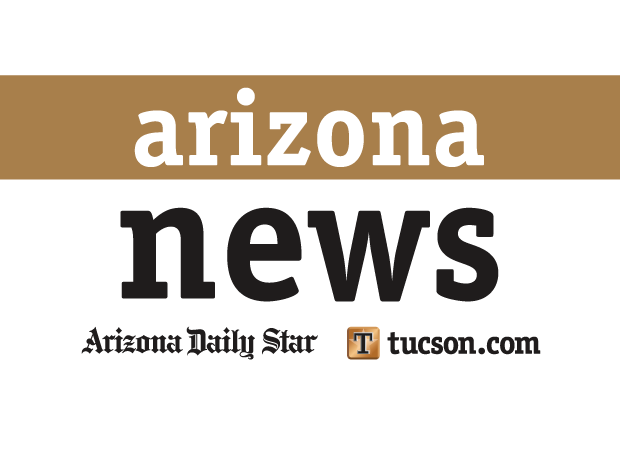Opponents to a planned copper mine near Superior haven’t backed down more than a year after the U.S. Congress approved a contentious land-swap deal turning over public land to a mining company.
Members of the San Carlos Apache tribe say they have been at the Oak Flat campground since February 2015, in opposition to plans to build North America’s largest copper mine in a popular recreation area that is considered sacred to the San Carlos Apache. Superior is approximately 110 miles north of Tucson.
Apache tribal leader Wendsler Nosie has been in Washington, D.C., pushing legislation to repeal the land exchange, which has garnered national attention since it was approved in December 2014.
“What I’m pleased about is the fact that everybody knows about the land exchange now,” Nosie said. “It has really woken up everybody as far as how legislation is done to undermine, not just Native Americans, but American people.”
The mine proposed by Resolution Copper Mining LLC — jointly owned by U.K.-based Rio Tinto Group and Australia-based BHP Billiton Ltd. — would result in a 2-mile-wide, 1,000-foot-deep crater at Oak Flat, above the massive copper deposit.
The mine would generate $61 billion over its lifetime and bring 1,400 direct jobs to the economically depressed area, Resolution officials say.
A rally planned for tonight at the Global Justice Center in Tucson will highlight plans for a two-day march, starting Feb. 26, from the San Carlos Apache reservation to the Oak Flat site, in recognition of the ongoing encampment.
LAND-SWAP LEGISLATION
Opponents object to the controversial way in which the mining company acquired the national forest land. Legislators, including Sen. John McCain, unexpectedly attached the land-swap deal to the must-pass National Defense Authorization Act of 2015, to the outrage of the mine’s opponents.
A legislative effort to repeal the land-swap provision hasn’t made much headway. Last summer Rep. Raul Grijalva introduced H.R. 2811, the Save Oak Flat Act, which now has 40 co-sponsors. In November, Sen. Bernie Sanders, introduced an identical bill in the Senate.
Mine opponents have little hope of the legislation’s passage in the Republican-controlled Congress. But it could be a decade before any actual mining could start near Oak Flat, so opponents are holding out hope the deal could be repealed before then.
“There is a lot of popular support for this thing,” said Curt Shannon, Arizona policy analyst for the Access Fund. But in the current Congress, “it’s never going to see the light of day.”
FOREST SERVICE
The public can now submit objections to the U.S. Forest Service’s preliminary approval, issued in January, for Resolution to begin studying a proposed dump site for 1.7 billion tons of mine waste tailings. The proposed tailings site in Queen Valley has generated opposition from nearby residents concerned the mine waste could contaminate their air and water.
Within months, the U.S. Forest Service will begin an environmental impact study on the proposed mine.
“The mining plan of operations that exists today will be changed and improved based on the NEPA (National Environmental Policy Act) process, which will look at alternatives, and address people’s problems and concerns,” said Vicky Peacey, a Resolution senior manager. “We’ll have a lot more environmental protections and mitigations before any operations begin.”
But the land-swap deal stipulated that 60 days after the environmental study is finalized, title to the land will officially be transferred to Resolution.
Critics say that means, regardless of the findings of the environmental study, the land is guaranteed to become private, reducing the Forest Service’s ability to compel Resolution to actually implement their recommendations.
Spokeswoman Carrie Templin said the Forest Service is still unsure how the transfer from public-to-private ownership will affect federal authority over the mine plan.
The uncertainty is problematic, said Roger Featherstone of the Arizona Mining Reform Coalition, a long-time opponent of the mine.
“We’ve told the Forest Service, you can’t start this process unless we the public know what the process is going to be,” he said. “You can’t make it up as you go along.”





